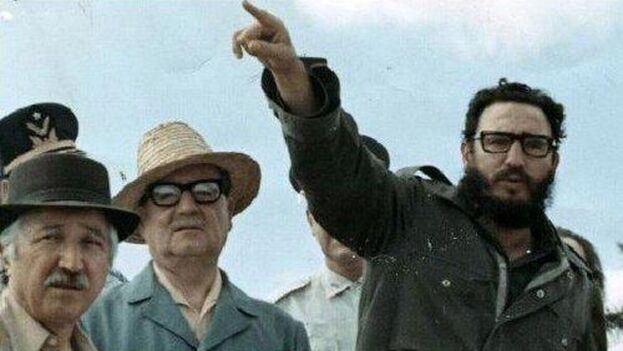
![]()
Néstor T. Carbonell, former VP of Pepsi Cola for many years, has published an extraordinary book on the Island: Why Cuba Matters. In the book he reviews the stormy relationships between Fidel Castro and the twelve tenants who have been in the White House. From the first, Ike Eisenhower, to Donald Trump, through Barack Obama, who made all the concessions to Havana, without any gesture of democratic reciprocity, violating the only common strategy of Republicans and Democrats for more than 60 years.
In that long period of coincidences and disagreements, genuine “hawks” like Ronald Reagan and even soft “pigeons” like Jimmy Carter had been at the helm of the American power, but all were convinced that any transaction with the Castros should include a verifiable withdrawal of Cuba’s international role as a pro-communist and “anti-Yankee” beacon in Latin America and Africa, although notable incursions into the Middle East were not lacking, as was the case with a 22-tank brigade operated by Cubans during the Yom Kippur war, fought between 1973 and 1974.
The problem, really, was that the Castros saw Cuba only as a base of operations to act in the international arena against Washington and against the hated “capitalism.” That was their leitmotif. The Castros, and especially Fidel, did not see themselves as the leaders of a communist revolution carried out on a poor sugar-producer island in the Caribbean, but rather as leaders of a political empire under construction. Not for nothing Fidel, at 18, changed his middle name, Hipólito, for “Alejandro.” He had in mind the Greek king who conquered an empire starting from the insignificant Macedonia.
Thus, his first triumph in Latin America was Chile, and it did not occur according to Castro’s script, but as a consequence of the Chilean electoral peculiarity. Salvador Allende was elected in 1970 with just over a third of the votes, and the Chilean parliament, being able to choose one of the other two parties, selected this Marxist physician, after forcing him to sign a document in which he promised to safeguard freedoms, something he only partially did.
The thesis behind Carbonell’s book is that democracy and freedoms have a magnificent side (the type of societies they foster), but they have another disturbing feature: the tendency to belittle the economically and technically weak adversaries who oppose them. They did it with Cuba and today they do it with Venezuela, Cuba’s protégé, without realizing the danger that this means.
Cubazuela, as the two countries are called in the neighborhood’s political jargon, have turned to crime to sustain their precarious power. Cuba provides Venezuelans with intelligence, military control, and support networks built over the years, while Venezuela pays Cubans with its own or Iranian gasoline, and with the little money it can spare from drug trafficking or the sale of illegally obtained gold. Meanwhile, Maduro, born in Colombia, is neither Venezuelan nor Colombian. He is a Cuban who owes his position to the Castros. He has discovered ideological citizenship.
Cuba was already a danger, but not having eliminated that infectious focus allowed it to metastasize to other nations, such as Venezuela, and there’s a risk that it will continue to expand to Colombia, Ecuador and Bolivia, all countries of the Andean arc. To avoid this immense damage, opposition politician María Corina Machado proposes a “multifaceted peace operation.” Venezuelan professor Carlos Blanco, in an excellent article, adds that it could be “an operation led by the OAS, based on the TIAR.” TIAR is the Inter-American Treaty of Reciprocal Assistance.
So far, Washington has limited itself to imposing sanctions and showing its fangs, but Latin American countries have no foreign policy, except Cuba and Venezuela, and I don’t think they will change.
I would start by lavishly giving Carbonell’s book to the Americans of the establishment. There you will see the immense mistake made by Republican Eisenhower and Democrat Kennedy for not having liquidated the communist revolution when it was in its cradle. Likewise, after the disappearance of the USSR, in the time of Bush (father), when another golden opportunity arose, for having assumed that the regime would “fall” by itself, as a result of lack of resources, without understanding the internal strength of dynastic communism, as has been verified not only in Cuba, but also in North Korea.
The regime not only did not fall: it had time to contaminate Venezuela and infect a good part of Latin America, prolonging the agony of our societies. If it is not eradicated it will be another immense error that we will all pay for, including the United States. That is very clear in Carbonell’s book.
________________
COLLABORATE WITH OUR WORK: The 14ymedio team is committed to practicing serious journalism that reflects Cuba’s reality in all its depth. Thank you for joining us on this long journey. We invite you to continue supporting us by becoming a member of 14ymedio now. Together we can continue transforming journalism in Cuba.
